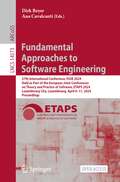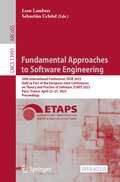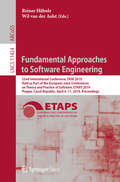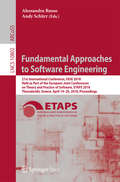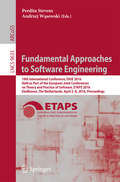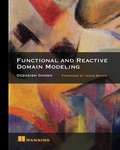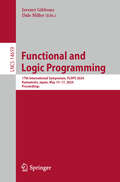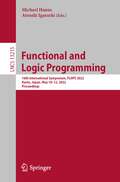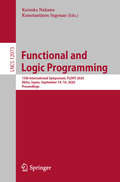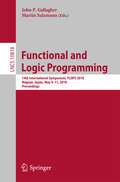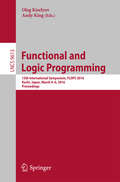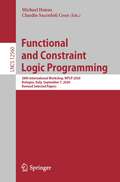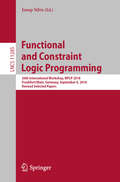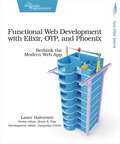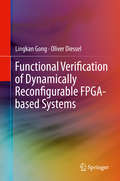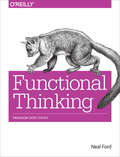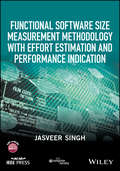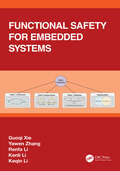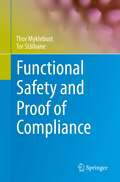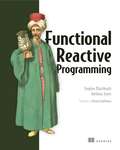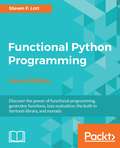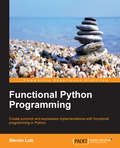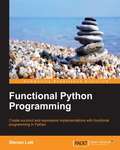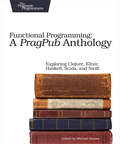- Table View
- List View
Fundamental Approaches to Software Engineering: 27th International Conference, FASE 2024, Held as Part of the European Joint Conferences on Theory and Practice of Software, ETAPS 2024, Luxembourg City, Luxembourg, April 6–11, 2024, Proceedings (Lecture Notes in Computer Science #14573)
by Ana Cavalcanti Dirk BeyerThis open access book constitutes the proceedings of the 27th International Conference on Fundamental Approaches to Software Engineering, FASE 2024, held in conjunction with ETAPS 2024 which took place in Luxembourg in April 2024. The 14 full papers included in this book were carefully reviewed and selected from 41 submission. The proceedings also include 5 short papers from the Test-Comp 2024 event that was hosted by FASE. They deal with the broad field of software engineering, focusing on requirements, design, architecture, modeling, applications of AI to software engineering and software engineering for AI-based systems, quality, model-driven engineering, processes, and software evolution.
Fundamental Approaches to Software Engineering: 26th International Conference, FASE 2023, Held as Part of the European Joint Conferences on Theory and Practice of Software, ETAPS 2023, Paris, France, April 22–27, 2023, Proceedings (Lecture Notes in Computer Science #13991)
by Leen Lambers Sebastián UchitelThis open access book constitutes the proceedings of the 26th International Conference on Fundamental Approaches to Software Engineering, FASE 2023, which was held during April 22-27, 2023, in Paris, France, as part of the European Joint Conferences on Theory and Practice of Software, ETAPS 2023. The 12 regular papers presented in this volume were carefully reviewed and selected from 50 submissions. The proceedings also contain 2 tool papers, 2 NIER papers, and 2 competition papers from the Test-Comp Competition. The papers deal with the foundations on which software engineering is built, including topics like software engineering as an engineering discipline, requirements engineering, software architectures, software quality, model-driven development, software processes, software evolution, AI-based software engineering, and the specification, design, and implementation of particular classes of systems, such as (self-)adaptive, collaborative, AI, embedded, distributed, mobile, pervasive, cyber-physical, or service-oriented applications. .
Fundamental Approaches to Software Engineering: 22nd International Conference, FASE 2019, Held as Part of the European Joint Conferences on Theory and Practice of Software, ETAPS 2019, Prague, Czech Republic, April 6–11, 2019, Proceedings (Lecture Notes in Computer Science #11424)
by Reiner Hähnle Wil van der AalstThis book is Open Access under a CC BY licence.This book constitutes the proceedings of the 22nd International Conference on Fundamental Approaches to Software Engineering, FASE 2019, which took place in Prague, Czech Republic in April 2019, held as Part of the European Joint Conferences on Theory and Practice of Software, ETAPS 2019.The 24 papers presented in this volume were carefully reviewed and selected from 94 submissions. The papers are organized in topical sections named: software verification; model-driven development and model transformation; software evolution and requirements engineering; specification, design, and implementation of particular classes of systems; and software testing.
Fundamental Approaches to Software Engineering: 21st International Conference, Fase 2018, Held As Part Of The European Joint Conferences On Theory And Practice Of Software, Etaps 2018, Thessaloniki, Greece, April 14-20, 2018, Proceedings (Lecture Notes in Computer Science #10802)
by Alessandra Russo Andy SchürrThis book is Open Access under a CC BY licence.This book constitutes the proceedings of the 21st International Conference on Fundamental Approaches to Software Engineering, FASE 2018, which took place in Thessaloniki, Greece in April 2018, held as Part of the European Joint Conferences on Theory and Practice of Software, ETAPS 2018.The 19 papers presented in this volume were carefully reviewed and selected from 63 submissions. The papers are organized in topical sections named: model-based software development; distributed program and system analysis; software design and verification; specification and program testing; family-based software development.
Fundamental Approaches to Software Engineering
by Andrzej Wąsowski Perdita StevensThis bookconstitutes the proceedings of the 19th International Conference on FundamentalApproaches to Software Engineering, FASE 2016, which took place in Eindhoven,The Netherlands, in April 2016, held as Part of the European Joint Conferenceson Theory and Practice of Software, ETAPS 2016. The 23 full papers presented in this volume were carefully reviewed and selectedfrom 90 submissions. They were organized in topical sections named: concurrentand distributed systems; model-driven development; analysis and bug triaging;probabilistic and stochastic systems; proof and theorem proving; andverification.
Functional and Reactive Domain Modeling
by Debasish GhoshSummaryFunctional and Reactive Domain Modeling teaches you how to think of the domain model in terms of pure functions and how to compose them to build larger abstractions.Purchase of the print book includes a free eBook in PDF, Kindle, and ePub formats from Manning Publications.About the TechnologyTraditional distributed applications won't cut it in the reactive world of microservices, fast data, and sensor networks. To capture their dynamic relationships and dependencies, these systems require a different approach to domain modeling. A domain model composed of pure functions is a more natural way of representing a process in a reactive system, and it maps directly onto technologies and patterns like Akka, CQRS, and event sourcing.About the BookFunctional and Reactive Domain Modeling teaches you consistent, repeatable techniques for building domain models in reactive systems. This book reviews the relevant concepts of FP and reactive architectures and then methodically introduces this new approach to domain modeling. As you read, you'll learn where and how to apply it, even if your systems aren't purely reactive or functional. An expert blend of theory and practice, this book presents strong examples you'll return to again and again as you apply these principles to your own projects.What's InsideReal-world libraries and frameworksEstablish meaningful reliability guaranteesIsolate domain logic from side effectsIntroduction to reactive design patternsAbout the ReaderReaders should be comfortable with functional programming and traditional domain modeling. Examples use the Scala language.About the AuthorSoftware architect Debasish Ghosh was an early adopter of reactive design using Scala and Akka. He's the author of DSLs in Action, published by Manning in 2010.Table of ContentsFunctional domain modeling: an introductionScala for functional domain modelsDesigning functional domain modelsFunctional patterns for domain modelsModularization of domain modelsBeing reactiveModeling with reactive streamsReactive persistence and event sourcingTesting your domain modelSummary - core thoughts and principles
Functional and Logic Programming: 17th International Symposium, FLOPS 2024, Kumamoto, Japan, May 15–17, 2024, Proceedings (Lecture Notes in Computer Science #14659)
by Dale Miller Jeremy GibbonsThis book constitutes the proceedings of the 17th International Symposium on Functional and Logic Programming, FLOPS 2024, held in Kumamoto, Japan, in May 2024. The 15 papers presented in this volume were carefully reviewed and selected from 28 submissions. The scope includes all aspects of the design, semantics, theory, applications, implementations, and teaching of declarative programming. FLOPS speci cally aims to promote cross-fertilization between theory and practice and among di erent styles of declarative programming.
Functional and Logic Programming: 16th International Symposium, FLOPS 2022, Kyoto, Japan, May 10–12, 2022, Proceedings (Lecture Notes in Computer Science #13215)
by Michael Hanus Atsushi IgarashiThis book constitutes the proceedings of the 16th International Symposium on Functional and Logic Programming, FLOPS 2022, held in Kyoto, Japan, in May 2022.The 12 papers presented in this volume were carefully reviewed and selected from 30 submissions. Additionally, the volume includes two system descriptions and a declarative pearl paper. The papers cover all aspects of the design, semantics, theory, applications, implementations, and teaching of declarative programming focusing on topics such as functional programming, logic programming, declarative programming, constraint programming, formal method, model checking, program transformation, program refinement, and type theory.
Functional and Logic Programming: 15th International Symposium, FLOPS 2020, Akita, Japan, September 14–16, 2020, Proceedings (Lecture Notes in Computer Science #12073)
by Keisuke Nakano Konstantinos SagonasThis book constitutes the proceedings of the 15th International Symposium on Functional and Logic Programming, FLOPS 2020, held in Akita, Japan*, in September 2020. The 12 papers presented in this volume were carefully reviewed and selected from 25 submissions. They cover all aspects of the design, semantics, theory, applications, implementations, and teaching of declarative programming focusing on topics such as functional programming, logic programming, declarative programming, constraint programming, formal method, model checking, program transformation, program refinement, and type theory. *The conference was held virtually due to the COVID-19 pandemic.
Functional and Logic Programming: 14th International Symposium, Flops 2018, Nagoya, Japan, May 9-11, 2018, Proceedings (Lecture Notes in Computer Science #10818)
by John P. Gallagher Martin SulzmannThis book constitutes the proceedings of the 14th International Symposium on Functional and Logic Programming, FLOPS 2018, held in Nagoya, Japan, in May 2018. The 17 papers presented in this volume were carefully reviewed and selected from 41 submissions. They cover all aspects of the design, semantics, theory, applications, implementations, and teaching of declarative programming focusing on topics such as functional-logic programming, re-writing systems, formal methods and model checking, program transformations and program refinements, developing programs with the help of theorem provers or SAT/SMT solvers, language design, and implementation issues.
Functional and Logic Programming
by Andy King Oleg KiselyovThis bookconstitutes the proceedings of the 13th International Symposium on Functionaland Logic Programming, FLOPS 2016, held in Kochi, Japan, in March 2016. The 14 papers presented in this volume were carefully reviewed and selectedfrom 36 submissions. They cover the following topics: functional and logicprogramming; program transformation and re-writing; and extracting programsfrom proofs of their correctness.
Functional and Constraint Logic Programming: 28th International Workshop, WFLP 2020, Bologna, Italy, September 7, 2020, Revised Selected Papers (Lecture Notes in Computer Science #12560)
by Michael Hanus Claudio Sacerdoti CoenThis book constitutes the refereed post-conference proceedings of the 28th International Workshop on Functional and Constraint Logic Programming, WFLP 2020, held in Bologna, Italy, in September 2020.Due to the COVID-19, the workshop was held online. From the 19 full papers submitted, 8 were accepted for presentation at the workshop. The accepted papers cover different programming areas of functional and logic programming, including code generation, verification, and debugging.
Functional and Constraint Logic Programming: 26th International Workshop, WFLP 2018, Frankfurt/Main, Germany, September 6, 2018, Revised Selected Papers (Lecture Notes in Computer Science #11285)
by Josep SilvaThis book constitutes the refereed post-conference proceedings of the 26th International Workshop on Functional and Constraint Logic Programming, WFLP 2018, held in Frankfurt/Main, Germany, in September 2018. From the 19 full papers submitted,12 were accepted for presentation at the workshop. During a second review after the workshop, 10 papers were accepted for inclusion in this volume. The papers cover different programming areas of functional and logic programming, including code generation, verification, and debugging. They are organized in the following topical sections: compilers and code generation; debugging and testing; and foundations of functional logic programming.
Functional Web Development with Elixir, OTP, and Phoenix: Rethink the Modern Web App
by Lance HalvorsenElixir and Phoenix are generating tremendous excitement as an unbeatable platform for building modern web applications. For decades OTP has helped developers create incredibly robust, scalable applications with unparalleled uptime. Make the most of them as you build a stateful web app with Elixir, OTP, and Phoenix. Model domain entities without an ORM or a database. Manage server state and keep your code clean with OTP Behaviours. Layer on a Phoenix web interface without coupling it to the business logic. Open doors to powerful new techniques that will get you thinking about web development in fundamentally new ways. Elixir and OTP provide exceptional tools to build rock-solid back-end applications that scale. In this book, you'll build a web application in a radically different way, with a back end that holds application state. You'll use persistent Phoenix Channel connections instead of HTTP's request-response, and create the full application in distinct, decoupled layers. In Part 1, start by building the business logic as a separate application, without Phoenix. Model the application domain with Elixir functions and simple data structures. By keeping state in memory instead of a database, you can reduce latency and simplify your code. In Part 2, add in the GenServer Behaviour to make managing in-memory state a breeze. Create a supervision tree to boost fault tolerance while separating error handling from business logic. Phoenix is a modern web framework you can layer on top of business logic while keeping the two completely decoupled. In Part 3, you'll do exactly that as you build a web interface with Phoenix. Bring in the application from Part 2 as a dependency to a new Phoenix project. Then use ultra-scalable Phoenix Channels to establish persistent connections between the stateful server and a stateful front-end client. You're going to love this way of building web apps! What You Need: You'll need a computer that can run Elixir version 1.5 or higher and Phoenix 1.3 or higher. Some familiarity with Elixir and Phoenix is recommended.
Functional Verification of Dynamically Reconfigurable FPGA-based Systems
by Lingkan Gong Oliver DiesselThis book analyzes the challenges in verifying Dynamically Reconfigurable Systems (DRS) with respect to the user design and the physical implementation of such systems. The authors describe the use of a simulation-only layer to emulate the behavior of target FPGAs and accurately model the characteristic features of reconfiguration. Readers are enabled with this simulation-only layer to maintain verification productivity by abstracting away the physical details of the FPGA fabric. Two implementations of the simulation-only layer are included: Extended Re Channel is a System C library that can be used to check DRS designs at a high level; ReSim is a library to support RTL simulation of a DRS reconfiguring both its logic and state. Through a number of case studies, the authors demonstrate how their approach integrates seamlessly with existing, mainstream DRS design flows and with well-established verification methodologies such as top-down modeling and coverage-driven verification.
Functional Thinking: Paradigm Over Syntax
by Neal FordIf you’re familiar with functional programming basics and want to gain a much deeper understanding, this in-depth guide takes you beyond syntax and demonstrates how you need to think in a new way. Software architect Neal Ford shows intermediate to advanced developers how functional coding allows you to step back a level of abstraction so you can see your programming problem with greater clarity.Each chapter shows you various examples of functional thinking, using numerous code examples from Java 8 and other JVM languages that include functional capabilities. This book may bend your mind, but you’ll come away with a much better grasp of functional programming concepts.Understand why many imperative languages are adding functional capabilitiesCompare functional and imperative solutions to common problemsExamine ways to cede control of routine chores to the runtimeLearn how memoization and laziness eliminate hand-crafted solutionsExplore functional approaches to design patterns and code reuseView real-world examples of functional thinking with Java 8, and in functional architectures and web frameworksLearn the pros and cons of living in a paradigmatically richer worldIf you’re new to functional programming, check out Josh Backfield’s book Becoming Functional.
Functional Software Size Measurement Methodology with Effort Estimation and Performance Indication
by Jasveer SinghPresents a new, effective methodology in software size measurement Software size measurement is an extremely important and highly specialized aspect of the software life cycle. It is used for determining the effort and cost estimations for project planning purposes of a software project’s execution, and/or for other costing, charging, and productivity analysis purposes. Many software projects exceed their allocated budget limits because the methodologies currently available lack accuracy. The new software size measurement methodology presented in this book offers a complete procedure that overcomes the deficiencies of the current methodologies, allowing businesses to estimate the size and required effort correctly for all their software projects developed in high level languages. The Functional Software Size Measurement Methodology with Effort Estimation and Performance Indication (FSSM) allows for projects to be completed within the defined budget limits by obtaining accurate estimations. The methodology provides comprehensive and precise measurements of the complete software whereby factual software size determination, development effort estimation, and performance indications are obtained. The approach is elaborate, effective and accurate for software size measurement and development effort estimation, avoiding inaccurate project planning of software projects. Key features: Pinpoints one of the major, originating root causes of erroneous planning by disclosing hidden errors made in software size measurement, and consequently in effort estimates and project planning All the major relevant and important aspects of software size measurement are taken into consideration and clearly presented to the reader Functional Software Size Measurement Methodology with Effort Estimation and Performance Indication is a vital reference for software professionals and Master level students in software engineering. For further information and materials relating to this book, such as FSSM 1.0 Calculations Template for Results Tables and Graphs, containing Calculations, and Results Tables/Graphs for the Mini FSSM Example, please visit the following two accompanying websites: http://booksupport.wiley.com www.fssm.software
Functional Safety for Embedded Systems
by Kenli Li Guoqi Xie Renfa Li Keqin Li Yawen ZhangThis book uses automotive embedded systems as an example to introduce functional safety assurance and safety-aware cost optimization. The book explores functional safety assurance from the perspectives of verification, enhancement, and validation. The functional safety assurance methods implement a safe and efficient assurance system that integrates safety verification, enhancement, and validation. The assurance methods offered in this book could provide a reasonable and scientific theoretical basis for the subsequent formulation of automotive functional safety standards. The safety-aware cost optimization methods divide cost types according to the essential differences of various costs in system design and establish reasonable models based on different costs. The cost optimization methods provided in this book could give appropriate cost optimization solutions for the cost-sensitive automotive industry, thereby achieving effective cost management and control. Functional safety assurance methods and safety-aware cost optimization support each other and jointly build the architecture of functional safety design methodologies for automotive embedded systems. The work aspires to provide a relevant reference for students, researchers, engineers, and professionals working in this area or those interested in hardware cost optimization and development cost optimization design methods based on ensuring functional safety in general.
Functional Safety and Proof of Compliance
by Thor Myklebust Tor StålhaneThis book aims to facilitate and improve development work related to all documents and information required by functional safety standards. Proof of Compliance (PoC) is important for the assessor and certification bodies when called up to confirm that the manufacturer has developed a software system according to the required safety standards. While PoC documents add functionality to the product neither for the developer nor for the customer, they do add confidence and trust to the product and ease certification, and as such are important for the product’s value. In spite of this added value, the documentation needed for PoC is often developed late in the project and in a haphazard manner. This book aims at developers, assessors, certification bodies, and purchasers of safety instrumented systems and informs the reader about the most important PoC documents. A typical PoC documentation encompasses 50 to 200 documents, several of which are named in the safety standards (e.g., 82 documents in IEC 61508:2010 series, 101 documents in EN 5012X series and 106 work products in ISO 26262:2018 series). These documents also include further references, typically one to twenty of them, and the total number of pages developed by the manufacturer varies between 2000 and 10000 pages. The book provides guidance and examples what to include in the relevant plans and documents.
Functional Reactive Programming
by Stephen BlackheathSummaryFunctional Reactive Programming teaches the concepts and applications of FRP. It offers a careful walk-through of core FRP operations and introduces the concepts and techniques you'll need to use FRP in any language.Purchase of the print book includes a free eBook in PDF, Kindle, and ePub formats from Manning Publications.About the TechnologyToday's software is shifting to more asynchronous, event-based solutions. For decades, the Observer pattern has been the go-to event infrastructure, but it is known to be bug-prone. Functional reactive programming (FRP) replaces Observer, radically improving the quality of event-based code.About the BookFunctional Reactive Programming teaches you how FRP works and how to use it. You'll begin by gaining an understanding of what FRP is and why it's so powerful. Then, you'll work through greenfield and legacy code as you learn to apply FRP to practical use cases. You'll find examples in this book from many application domains using both Java and JavaScript. When you're finished, you'll be able to use the FRP approach in the systems you build and spend less time fixing problems. What's InsideThink differently about data and eventsFRP techniques for Java and JavaScriptEliminate Observer one listener at a timeExplore Sodium, RxJS, and Kefir.js FRP systemsAbout the ReaderReaders need intermediate Java or JavaScript skills. No experience with functional programming or FRP required.About the AuthorsStephen Blackheath and Anthony Jones are experienced software developers and the creators of the Sodium FRP library for multiple languages. Foreword by Heinrich Apfelmus. Illustrated by Duncan Hill.Table of ContentsStop listening! Core FRP Some everyday widget stuff Writing a real application New concepts FRP on the web Switch Operational primitives Continuous time Battle of the paradigms Programming in the real world Helpers and patterns Refactoring Adding FRP to existing projects Future directions
Functional Python Programming: Discover the power of functional programming, generator functions, lazy evaluation, the built-in itertools library, and monads, 2nd Edition
by Steven F. LottCreate succinct and expressive implementations with functional programming in PythonKey Features Learn how to choose between imperative and functional approaches based on expressiveness, clarity, and performance Get familiar with complex concepts such as monads, concurrency, and immutability Apply functional Python to common Exploratory Data Analysis (EDA) programming problemsBook DescriptionIf you’re a Python developer who wants to discover how to take the power of functional programming (FP) and bring it into your own programs, then this book is essential for you, even if you know next to nothing about the paradigm. Starting with a general overview of functional concepts, you’ll explore common functional features such as first-class and higher-order functions, pure functions, and more. You’ll see how these are accomplished in Python 3.6 to give you the core foundations you’ll build upon. After that, you’ll discover common functional optimizations for Python to help your apps reach even higher speeds. You’ll learn FP concepts such as lazy evaluation using Python’s generator functions and expressions. Moving forward, you’ll learn to design and implement decorators to create composite functions. You'll also explore data preparation techniques and data exploration in depth, and see how the Python standard library fits the functional programming model. Finally, to top off your journey into the world of functional Python, you’ll at look at the PyMonad project and some larger examples to put everything into perspective. What you will learn Use Python's generator functions and generator expressions to work with collections in a non-strict (or lazy) manner Utilize Python library modules including itertools, functools, multiprocessing, and concurrent features to ensure efficient functional programs Use Python strings with object-oriented suffix notation and prefix notation Avoid stateful classes with families of tuples Design and implement decorators to create composite functions Use functions such as max(), min(), map(), filter(), and sorted() Write higher-order functionsWho this book is forThis book is for Python developers who would like to perform Functional programming with Python. Python Programming knowledge is assumed.
Functional Python Programming - Second Edition: Discover The Power Of Functional Programming, Generator Functions, Lazy Evaluation, The Built-in Itertools Library, And Monads, 2nd Edition
by Steven F. LottPython is an easy-to-learn and extensible programming language that offers a number of functional programming features. This practical guide demonstrates the Python implementation of a number of functional programming techniques and design patterns. Through this book, you’ll understand what functional programming is all about, its impact on the programming workflow, why it's important, and how to implement it in Python.
Functional Python Programming
by Steven LottThis book is for developers who want to use Python to write programs that lean heavily on functional programming design patterns. You should be comfortable with Python programming, but no knowledge of functional programming paradigms is needed.
Functional Python Programming
by Steven Lott<P><P>Key Features <P><P>Implement common functional programming design patterns and techniques in Python <P><P>Learn how to choose between imperative and functional approaches based on expressiveness, clarity, and performance <P><P>Apply functional Python to common Exploratory Data Analysis (EDA) programming problems <P><P>Book Description <P><P>Python’s easy-to-learn and extensible abilities offer a number of functional programming features for you to bring into your workflow, especially in the realm of data science. <P><P>If you’re a Python developer who wants to discover how to take the power of functional programming and bring it into your own programs then this book is essential for you, even if you know next to nothing about the paradigm. Starting with a general overview of functional concepts you’ll explore common functional features such as first-class and higher-order functions, pure functions and more, and how these are accomplished in Python to give you the core foundations you’ll build upon. After that, you’ll discover common functional optimizations for Python to help your apps reach even higher speeds. You'll also explore data preparation techniques and data exploration in depth, along with learning how the Python standard library fits the functional programming model. Finally, to top off your journey into the world of function Python you’ll at look at the PyMonad project and some larger examples to put everything into perspective. <P><P>With Functional Python Programming by your side you’ll understand the core concepts of function Python, its impact on the programming workflow, and how to implement it in Python, giving you the ability to take your applications to an even higher level. <P><P>What you will learn <P><P>Use Python's generator functions and generator expressions to work with collections in a non-strict (or lazy) manner <P><P>Utilize Python library modules including itertools, functools, multiprocessing, and concurrent.futures for efficient functional programs <P><P>Use Python strings with object-oriented suffix notation and prefix notation <P><P>Avoid stateful classes by making use of families of tuples <P><P>Design and implement decorators to create composite functions <P><P>Use functions like max(), min(), map(), filter(), and sorted() <P><P>Write advanced higher-order functions
Functional Programming: Exploring Clojure, Elixir, Haskell, Scala, and Swift
by Michael SwaineExplore functional programming and discover new ways of thinking about code. You know you need to master functional programming, but learning one functional language is only the start. In this book, through articles drawn from PragPub magazine and articles written specifically for this book, you'll explore functional thinking and functional style and idioms across languages. Led by expert guides, you'll discover the distinct strengths and approaches of Clojure, Elixir, Haskell, Scala, and Swift and learn which best suits your needs. Contributing authors: Rich Hickey, Stuart Halloway, Aaron Bedra, Michael Bevilacqua-Linn, Venkat Subramaniam, Paul Callaghan, Jose Valim, Dave Thomas, Natasha Murashev, Tony Hillerson, Josh Chisholm, and Bruce Tate. Functional programming is on the rise because it lets you write simpler, cleaner code, and its emphasis on immutability makes it ideal for maximizing the benefits of multiple cores and distributed solutions. So far nobody's invented the perfect functional language - each has its unique strengths. In Functional Programming: A PragPub Anthology, you'll investigate the philosophies, tools, and idioms of five different functional programming languages.See how Swift, the development language for iOS, encourages you to build highly scalable apps using functional techniques like map and reduce. Discover how Scala allows you to transition gently but deeply into functional programming without losing the benefits of the JVM, while with Lisp-based Clojure, you can plunge fully into the functional style. Learn about advanced functional concepts in Haskell, a pure functional language making powerful use of the type system with type inference and type classes. And see how functional programming is becoming more elegant and friendly with Elixir, a new functional language built on the powerful Erlang base.The industry has been embracing functional programming more and more, driven by the need for concurrency and parallelism. This collection of articles will lead you to mastering the functional approach to problem solving. So put on your explorer's hat and prepare to be surprised. The goal of exploration is always discovery.What You Need:Familiarity with one or more programming languages.
